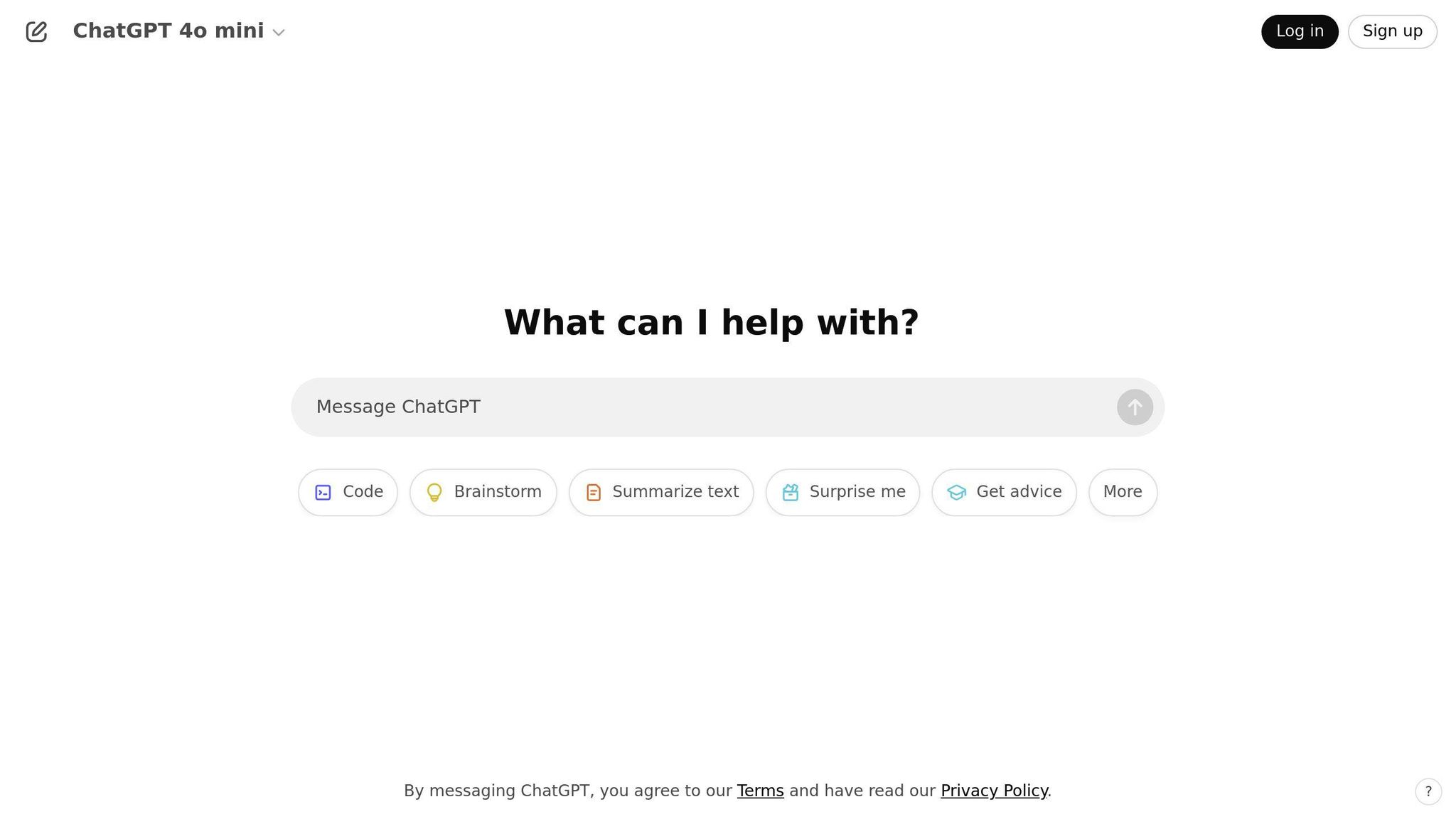ChatGPT is a powerful AI language model that can assist with various SEO tasks, but it has limitations and should not replace human expertise. Here's a quick overview:
Using ChatGPT for SEO
- Content Creation: Generate outlines, drafts, and optimized content
- Keyword Research: Find relevant keywords and related terms
- Metadata Optimization: Create optimized titles, descriptions, and headers
Key Limitations
- Knowledge Cutoff: May lack up-to-date information on recent trends
- Inaccuracies: Generated content may contain errors or irrelevant information
- Lack of Context: Struggles to provide context-specific, coherent content
Best Practices
- Use ChatGPT as a tool, not a replacement for human expertise
- Validate and refine generated content for accuracy and relevance
- Combine AI assistance with human judgment and oversight
- Monitor performance metrics to refine your SEO strategy
To optimize SEO with ChatGPT, leverage its capabilities for content creation, keyword research, and metadata optimization, while balancing AI assistance with human expertise and data-driven decision-making.
Related video from YouTube
ChatGPT's Current Limits for SEO

ChatGPT, despite its impressive capabilities, has certain limitations that are essential to understand when using it for SEO purposes. These limitations can significantly impact the effectiveness of your SEO strategy if not acknowledged and addressed.
Knowledge Cutoff
One of the primary limitations of ChatGPT is its knowledge cutoff. The model was trained on a vast amount of text data, but this data only goes up to a certain point in time. This means that ChatGPT may not have information on very recent events, updates, or trends.
| Impact on SEO | Why it matters |
|---|---|
| Inaccurate guidance | ChatGPT may not provide accurate guidance on new Google algorithm updates or recent SEO trends. |
| Outdated information | The model's knowledge cutoff can lead to outdated information, which can negatively impact your website's credibility and search engine rankings. |
Inaccuracy and Incompleteness
Another limitation of ChatGPT is the potential for inaccuracy and incompleteness in its generated content.
| Types of errors | Consequences |
|---|---|
| Outdated information | Harm to website credibility and search engine rankings |
| Incorrect keywords | Negative impact on search engine rankings |
| Irrelevant links | Harm to website credibility and user experience |
Lack of Contextualization
ChatGPT also struggles with contextualization, which is critical in SEO.
| Impact on SEO | Why it matters |
|---|---|
| Low-quality content | ChatGPT may generate content that lacks relevance or coherence, leading to low-quality content that fails to engage your target audience or resonate with search engines. |
| Negative user experience | Poorly contextualized content can lead to a negative user experience, harming your website's credibility and search engine rankings. |
To overcome these limitations, it's essential to use ChatGPT as a tool, rather than a replacement for human expertise and judgment. By understanding its limitations and using it in conjunction with human oversight and input, you can maximize the benefits of ChatGPT for your SEO strategy.
Using ChatGPT for SEO Planning
ChatGPT can be a valuable tool in formulating an effective SEO strategy by assisting with tasks such as identifying content clusters, generating seed keywords, and suggesting viable content ideas to target specific audience segments.
Finding Content Clusters
One of the key benefits of using ChatGPT for SEO planning is its ability to suggest potential content clusters. By analyzing your existing content, competitor websites, and relevant industry data, ChatGPT can identify topics and themes that are closely related to your target keywords and audience interests.
Here's how you can leverage ChatGPT to find content clusters:
1. Provide input: Give ChatGPT a list of your target keywords and a brief overview of your business or website.
2. Analyze content: Ask ChatGPT to analyze your content and suggest potential content clusters based on semantic relationships and keyword co-occurrences.
3. Validate clusters: Validate the suggested content clusters by cross-referencing them with competitor analysis and keyword research tools.
Important note: While ChatGPT can provide valuable insights, its suggestions should be treated as a starting point rather than a definitive solution. Thorough competitor analysis and keyword research using dedicated SEO tools are still essential to ensure the relevance and viability of the identified content clusters.
Generating Seed Keywords
In addition to identifying content clusters, ChatGPT can also be used to generate seed keywords, which can serve as the foundation for further keyword research and content planning.
Here's how you can leverage ChatGPT to generate seed keywords:
1. Provide context: Give ChatGPT a brief description of your target audience, their pain points, and the solutions your business offers.
2. Get suggestions: Ask ChatGPT to suggest relevant seed keywords based on the provided information.
3. Refine keywords: Use the generated seed keywords as a starting point for more in-depth keyword research using dedicated SEO tools, such as analyzing search volume, relevance, and competition.
Important note: While ChatGPT can provide valuable keyword ideas, it's important to remember that its knowledge may not be up-to-date, and it may not have access to the most recent search data. Therefore, it's crucial to validate and refine the generated seed keywords using dedicated SEO tools and industry best practices.
By leveraging ChatGPT's capabilities in identifying content clusters and generating seed keywords, you can streamline your SEO planning process and gain valuable insights to inform your content strategy. However, it's essential to validate and refine these insights using dedicated SEO tools and human expertise to ensure the effectiveness of your SEO efforts.
Creating Content with ChatGPT
ChatGPT can be a powerful tool for generating content ideas, outlines, and even rough drafts. However, it's essential to remember that the content generated by ChatGPT should be treated as a starting point and will likely require significant editing and refinement by a human to ensure quality, accuracy, and alignment with your specific goals and brand voice.
Drafting Article Outlines
One of the most useful applications of ChatGPT for content creation is generating article outlines. By providing ChatGPT with a topic or keyword, you can ask it to generate an outline with subheadings and bullet points. Here's an example prompt:
"Generate an outline for a blog post on 'The Benefits of Using ChatGPT for SEO,' including subheadings and bullet points."
ChatGPT's response might look something like this:
| Section | Subheadings | Bullet Points |
|---|---|---|
| Introduction | Explain what ChatGPT is and its potential for SEO | |
| Generating Content Ideas and Outlines | ChatGPT can help brainstorm content ideas and topics | • It can create detailed outlines with subheadings and bullet points |
| Writing Drafts and Optimizing Content | ChatGPT can generate rough drafts of articles and blog posts | • Its content can be optimized for SEO with the right prompts |
| Improving Efficiency and Productivity | Using ChatGPT can save time in the content creation process | • It can help overcome writer's block and generate new ideas |
| Limitations and Best Practices | ChatGPT's content still needs human editing and fact-checking | • Best practices for using ChatGPT for SEO content creation |
While the outline may not be perfect, it provides a solid structure and starting point for your content. You can then refine and expand on the outline based on your specific needs and expertise.
Writing and Optimizing Content
In addition to generating outlines, ChatGPT can also be prompted to write complete articles or blog posts. However, it's important to note that the quality and accuracy of the generated content can vary, and it will likely require significant editing and fact-checking by a human expert.
To generate content with ChatGPT, you can provide it with a detailed prompt that includes the desired topic, length, and any specific requirements or guidelines. For example:
"Write a 1,000-word blog post on 'The Benefits of Using ChatGPT for SEO.' Include information on how ChatGPT can be used to generate content ideas, outlines, and drafts, as well as best practices for optimizing the content for SEO. The content should be well-researched, informative, and engaging."
ChatGPT will then generate a rough draft of the article based on your prompt. While the content may be coherent and well-structured, it's crucial to review and edit it thoroughly to ensure accuracy, relevance, and alignment with your brand voice and SEO goals.
Additionally, you can prompt ChatGPT to optimize the content for specific keywords or phrases by including them in your prompt or asking it to incorporate them into the generated text. However, it's important to strike a balance and avoid keyword stuffing, as this can negatively impact the readability and quality of the content.
sbb-itb-b8bc310
Improving Content Format and Metadata
To make your content more readable and appealing to search engines, you can use ChatGPT to optimize its format and metadata.
Formatting Content Better
Proper formatting is essential for making your content easy to read and understand. ChatGPT can help you structure your content with tables, lists, and FAQs.
For example, you can ask ChatGPT to convert a block of text into a table with columns for Feature, Description, and Benefit. This makes the content more digestible and user-friendly.
You can also ask ChatGPT to create ordered or unordered lists from a block of text, making it easier for readers to scan and comprehend the information.
Additionally, ChatGPT can help you create FAQ sections by providing it with relevant information and prompting it to generate questions and answers.
Optimizing Metadata with ChatGPT
Metadata, such as titles and descriptions, plays a crucial role in search engine visibility and user engagement. ChatGPT can assist you in generating metadata options that accurately reflect the content and incorporate relevant keywords.
For instance, you can prompt ChatGPT to suggest three different title options for an article that incorporate specific keywords. ChatGPT will then provide you with three title suggestions that include your target keywords.
Similarly, you can ask ChatGPT to generate meta descriptions for your content, ensuring they are concise, informative, and enticing to potential readers.
However, it's essential to fine-tune the metadata based on performance insights gathered from your site analytics. Continuously monitor the effectiveness of your metadata and make adjustments as needed to optimize for better search visibility and user engagement.
Streamlining SEO Tasks with ChatGPT
You can significantly improve your workflow and productivity by streamlining SEO tasks with ChatGPT. By automating repetitive tasks and leveraging ChatGPT's natural language understanding capabilities, you can focus on high-priority tasks that require human expertise.
Automating Content Idea Generation
Generating content ideas can be a time-consuming task, especially when you need to come up with diverse and SEO-friendly topics. ChatGPT can quickly produce a list of content ideas based on your target keywords, saving you hours of research and brainstorming.
To get started, simply prompt ChatGPT with your target keywords and ask it to generate a list of content ideas. You can also provide additional context, such as your target audience and content format, to refine the output.
| Step | Action |
|---|---|
| 1 | Provide target keywords to ChatGPT |
| 2 | Ask ChatGPT to generate a list of content ideas |
| 3 | Refine the output by providing additional context (optional) |
Once you have a list of ideas, it's essential to vet them for relevance and alignment with your target audience. This ensures that the content you create resonates with your audience and addresses their needs and pain points.
Creating Content Briefs and Optimizing Keywords
ChatGPT can also help you create SEO content briefs with keyword optimization. By providing ChatGPT with your target keywords and content requirements, it can generate a comprehensive content brief that includes keyword research, content outline, and optimization guidelines.
To create a content brief with ChatGPT, simply prompt it with your target keywords, content format, and tone. You can also provide additional context, such as your target audience and content goals, to refine the output.
| Step | Action |
|---|---|
| 1 | Provide target keywords to ChatGPT |
| 2 | Ask ChatGPT to generate a content brief |
| 3 | Refine the output by providing additional context (optional) |
By streamlining SEO tasks with ChatGPT, you can improve your workflow, increase productivity, and create high-quality content that resonates with your target audience.
Measuring ChatGPT's Impact on SEO
To understand how ChatGPT affects your website's search engine rankings, organic traffic, and user engagement, you need to track key performance metrics. This helps you refine your SEO strategy, identify areas for improvement, and optimize your content for better results.
Performance Metrics
Focus on the following metrics to measure ChatGPT's impact on SEO:
| Metric | Description |
|---|---|
| Organic Traffic | The number of visitors coming from search engines |
| Search Engine Rankings | The position of your website in search engine results pages (SERPs) |
| Bounce Rate | The percentage of visitors leaving your website immediately |
| Average Session Duration | The time spent by visitors on your website |
| Conversion Rate | The percentage of visitors completing a desired action |
User Engagement
Track the following metrics to measure user engagement:
| Metric | Description |
|---|---|
| Time on Page | The time spent by visitors on a specific page |
| Scroll Depth | The percentage of visitors scrolling to the bottom of a page |
| Click-through Rate (CTR) | The percentage of visitors clicking on a link or button |
| Social Shares | The number of social media shares for your content |
Analyzing Data
To analyze the data and measure ChatGPT's impact on SEO, follow these steps:
1. Set up analytics tools: Use tools like Google Analytics, SEMrush, or Ahrefs to track performance metrics and user engagement.
2. Define goals and objectives: Identify the desired outcomes for your SEO strategy, such as increasing organic traffic or improving search engine rankings.
3. Monitor and analyze data: Regularly review performance metrics and user engagement data to identify trends, opportunities, and areas for improvement.
4. Refine your SEO strategy: Adjust your SEO strategy based on the data analysis, focusing on content optimization, keyword research, and technical SEO improvements.
By measuring ChatGPT's impact on SEO and analyzing the data, you can refine your strategy, improve performance, and drive more organic traffic to your website.
Conclusion: Using ChatGPT for SEO
ChatGPT is a powerful tool that can help with SEO tasks, such as content creation and optimization. However, it's essential to remember that ChatGPT is not a replacement for human expertise and judgment.
Key Takeaways
To get the most out of ChatGPT for SEO, keep the following points in mind:
| Point | Description |
|---|---|
| Understand limitations | ChatGPT has limitations, such as knowledge cutoff and potential inaccuracies. |
| Balance AI and human expertise | Combine ChatGPT's capabilities with human judgment and oversight for optimal results. |
| Monitor and analyze data | Track performance metrics and user engagement to refine your SEO strategy. |
By following these guidelines, you can effectively use ChatGPT to improve your website's search engine rankings and drive more organic traffic.
Remember, the key to success lies in finding the right balance between AI-assistance and human expertise. By working together, you can create high-quality content that resonates with your audience and improves your website's search engine rankings.
FAQs
How to Optimize SEO with ChatGPT?
To optimize SEO with ChatGPT, you can use it for:
| Task | Description |
|---|---|
| Keyword Research | Find relevant keywords, long-tail queries, and semantically related keywords |
| Content Generation | Create high-quality content that resonates with your target audience |
| Metadata Creation | Create optimized title tags, meta descriptions, and header tags |
Can ChatGPT Generate SEO Content?
Yes, ChatGPT can generate SEO content, including blog posts, social media posts, and emails. To get the best results, provide ChatGPT with details about your brand's voice, such as tone and style.
Is ChatGPT Good for SEO Content?
While ChatGPT can be useful for generating SEO content, it's not a replacement for human expertise and judgment. ChatGPT's writing can be vague, inaccurate, and robotic at times. Therefore, it's essential to review and edit the generated content to ensure it meets your quality standards.


